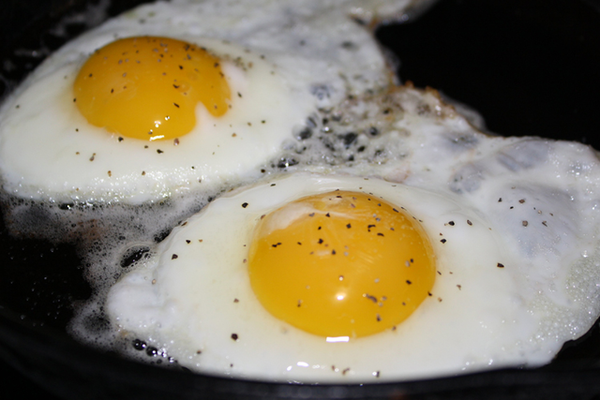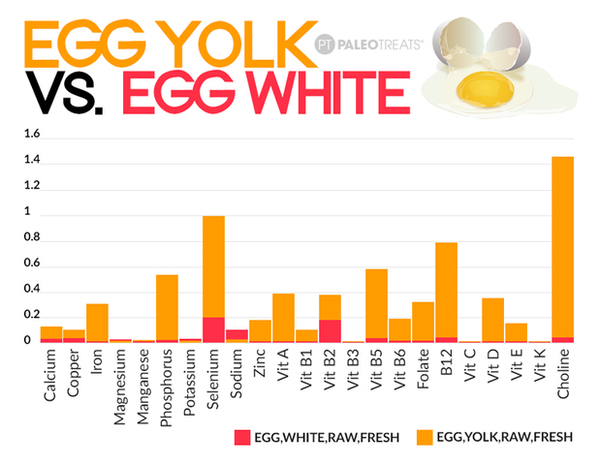- Continue Shopping
- Your Cart is Empty
Egg whites, yolks and nutritional blasphemy.
The battle between eating egg whites and egg yolks is ubiquitous, yet eating egg whites and throwing away the yolks is nutritional blasphemy!
Wait! Didn't Mom tell you to...
What about cholesterol? What about (here we go again) nutrient density?

- Dietary cholesterol is at best a marginal factor for increased risk of hypercholesterolemia or atherosclerosis or coronary heart disease (CHD)
- Nutrient density of egg yolks crushes egg whites.
Does Dietary Cholesterol Actually Matter?
Of course cholesterol matters! The big question is this: Does cholesterol create or accentuate negative health outcomes?
After years and years of seemingly bi-monthly articles hammering the ill effects of dietary cholesterol (DC), seeing this vital nutrient in a overly negative light has become engrained in popular American nutritional thought.
Just like the mid to late 21st century perception that “eating fat makes you fat", the "cholesterol is b-aaaad" refrain (and along with that the vendetta against egg yolks) needs to be re-examined.
The short version is it’s complicated and based on a multitude of factors because multivariate organisms like humans are a complicated species. Damn, that started to be a long answer and I just barely managed to cut it off.
Let me try again.
Obviously, too much of any one thing is generally going to be bad for your health, whether its water, tequila, sunlight, broccoli, or dietary cholesterol (DC).
However, due to the onslaught of inaccurate press, dietary cholesterol gets an unwarranted bad reputation that results in people removing foods from their diet that are otherwise very beneficial. What kind of foods? You guessed it, EGG YOLKS!
Let's start at the beginning. As Maria (played by Julie Andrews) once noted in The Sound Of Music, it's a very good place to start. Heads up, it's about to get all science-y in here.
Ancel Keys, the man who first created the “fat=bad” hypothesis in 1953 (which was later twisted into "cholesterol is bad") said,
“that dietary cholesterol is not important for man would be predicated from the fact that the biliary output of cholesterol from the human liver is from 10 to 20 times as much as the daily amount of cholesterol in any diet of natural foods”.
What does that mean? Well, he's basically saying that dietary cholesterol doesn't matter.
Ancel Keys' work regarding cholesterol has been reviewed several times since the 1950s. At one point it got hyped up and twisted to make out cholesterol to be a bad agent, so in the 1960s the US government recommended a diet with 300mg or less of cholesterol per day. More recent studies have shown that that dietary cholesterol doesn't have the negative impact we once thought it did.
"…current epidemiologic data have clearly demonstrated that increasing concentrations of DC are not correlated with increased risk of CHD (Coronary Heart Diseas). Clinical studies have shown that even if DC may increase plasma low-density lipoprotein (LDL) cholesterol in certain individuals (hyper-responders), this is always accompanied by increases in high-density lipoprotein (HDL) cholesterol, so the LDL/HDL cholesterol ratio is maintained. MORE IMPORTANTLY, DC REDUCES CIRCULATING LEVELS OF SMALL, DENSE LDL PARTICLES, a well-defined risk factor for CHD”. (source)
Where does that leave us? Although overly excessive amounts of DC (Dietary Cholesterol) are likely to be unhealthy, the blanket vilification of DC is definitely unfounded in science:
Let's back off the heavy science and switch to surfer talk:
Wanting to avoid dietary cholesterol is a lame reason to avoid eating the yolks.
For more info about cholesterol check out this Paleo Solution podcast featuring Chris Kresser;
NUTRIENT DENSITY: ANOTHER REASON TO EAT THE YOLKS!
Back on the nutrient density topic again! As you can see below, yolks decimate egg whites in essential vitamin and mineral content; yolks with a score of 17.45 and egg whites with a score of -6.9.
Add in the existence of essential fats and fatty acids present in the yolks and the discrepancy in these nutrient density scores would be even larger.

A common conception is that the egg whites have “all” of the protein. The protein contents of egg yolk and egg white are similar (3.6g white vs. 2.7g yolk). Additionally, it is a non-argument because few people eat only the yolks, although this practice would be much much better from a nutrition standpoint than the commonplace practice of eating only the whites.
So, where does that leave us? Should you eat only the whites? The yolks? Or both?
The egg whites will give you a little more than half of the protein you could have gotten otherwise, and very little nutrients. The yolk will give you the rest of the protein and a lot of the nutrients.
What if you eat (gasp!) the whole egg? You get all the benefits, double the protein, and none of the drawbacks. Go ahead and start cracking eggs, and don't forget to eat the yolks!
What!? You disagree? Ok, tell me about it using the comments, below. Thanks for reading!
Nik Hawks
Nik Hawks helps run the show at Paleo Treats. Fascinated by humans in all their strange glory, Nik is harnessed in and pulling hard in pursuit of excellence with the rest of the PT Crew. Enjoy!
1 Comment
Paleo Raiser
Those who fear life will listen to the puppeteers. Those who live life don’t pull any strings, they eat what is created, as all things in balance depend on the other for survival. Tossing the gold is not going to solve the other unbalanced issues, its like trying to be an escape artist with no exit.
Eat Paleo, then top it with an egg. Boiled, poached or fried, maybe even raw if its good, but my goodness eat and thrive! Great post, hits home, hits hard and people need to listen.







